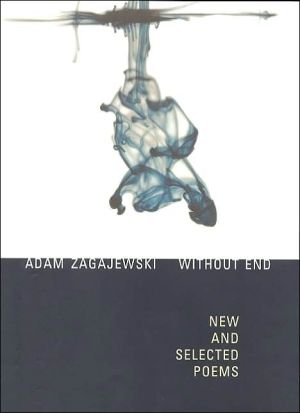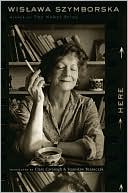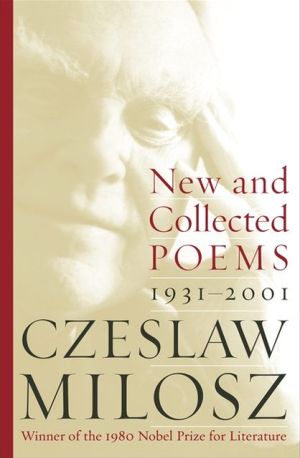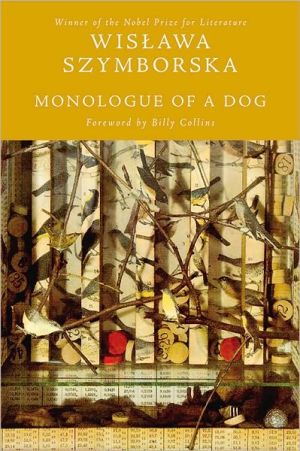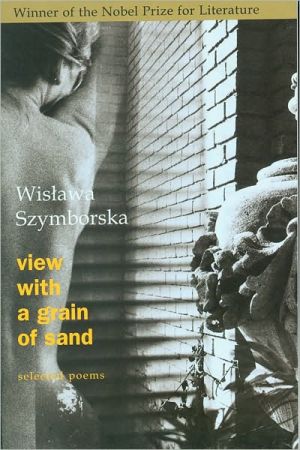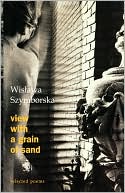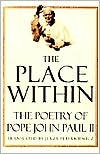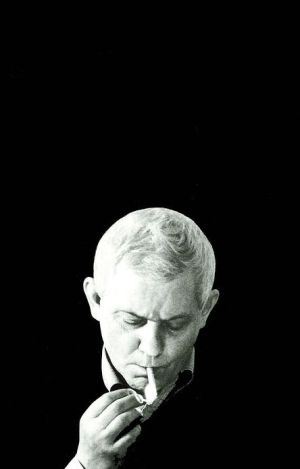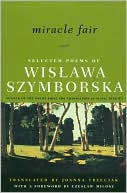Without End: New and Selected Poems
I love to swim in the sea, which keeps\ talking to itself\ in the monotone of a vagabond\ who no longer recalls\ exactly how long he’s been on the road.\ Swimming is like prayer:\ palms join and part,\ join and part,\ almost without end.\ —from "On Swimming"\ Without End draws from each of Adam Zagajewski's English-language collections, both in and out of print—Tremor, Canvas, and Mysticism for Beginners—and features new work that is among his most refreshing and rewarding. These poems,...
Search in google:
I love to swim in the sea, which keepstalking to itselfin the monotone of a vagabondwho no longer recalls exactly how long he’s been on the road. Swimming is like prayer:palms join and part,join and part,almost without end.—from "On Swimming"Without End draws from each of Adam Zagajewski's English-language collections, both in and out of print—Tremor, Canvas, and Mysticism for Beginners—and features new work that is among his most refreshing and rewarding. These poems, lucidly translated, share the vocation that allows us, in Zagajewski's words, "to experience astonishment and to stop still in that astonishment for a long moment or two."Joseph BrodskySeldom has the muse . . . spoken to anyone with such clarity and urgency as in Zagajewski s case.
Excerpted from Without End by Adam Zagajewski. Copyright © 2002 by Adam Zagajewski. To be published in March, 2003 by Farrar, Straus & Giroux, LLC. All rights reserved.\ TO SEE\ Oh my mute city, honey-gold, buried in ravines, where wolves loped softly down the cold meridian; if I had to tell you, city, asleep beneath a heap of lifeless leaves, if I needed to describe the ocean's skin, on which ships etch the lines of shining poems, and yachts like peacocks flaunt their lofty sails and the Mediterranean, rapt in salty concentration, and cities with sharp turrets gleaming in the keen morning sun, and the savage strength of jets piercing the clouds, the bureaucrats' undying scorn for us, people, Umbria's narrow streets like cisterns that stop up ancient time tasting of sweet wine, and a certain hill, where the stillest tree is growing, gray Paris, threaded by the river of salvation, Krakow, on Sunday, when even chestnut leaves seem pressed by an unseen iron, vineyards raided by the greedy fall and by highways full of fear; if I had to describe the sobriety of the night when it happened, and the clatter of the train running into nothingness and the blade flaring on a makeshift skating rink; I'm writing from the road, I had to see, and not just know, to see clearly the sights and fires of a single world, but you unmoving city turned to stone, my brethren in the shallow sand; the earth still turns above you and the Roman legions march and a polar fox attends the wind in a white wasteland where sounds perish.\ THE SOUL\ We know we're not allowed to use your name. We know you're inexpressible, anemic, frail, and suspect for mysterious offenses as a child. We know that you are not allowed to live now in music or in trees at sunset. We know—or at least we've been told— that you do not exist at all, anywhere. And yet we still keep hearing your weary voice —in an echo, a complaint, in the letters we receive from Antigone in the Greek desert.\ FAREWELL FOR ZBIGNIEW HERBERT\ At first only cherries and the comic flight of bats, the apple moon, a drowsy owl, the tang of 0icy water on school outings. The city's towers rise like words of love. Afterwards, long after, Provence's golden dust, fig trees in the vineyards, the lesson of white Greece, obscure museums, Piero's Madonna great with child —in the interim, two occupations, two inhuman armies, death's clumsy vehicles patrol your streets.\ Long days spent translating Georg Trakl, "The Captive Blackbird's Song," that blissful first Paris after years of Soviet scarcity and squalor; your sly smile, your schoolboy jokes, the gravitas and cheer you brought to Meaux's little cathedral (Bossuet watched us rather dourly), Berlin evenings: Herr Doktor, Herr Privatdozent, the rice you scattered at friends' weddings like confetti— but the quiet bitterness of bad months, too.\ I liked to imagine your strolls in Umbria, Liguria: your dapper chase, your quest for places where the glaciers of the past melt, baring forms. I liked to imagine you roving through poetry's mountains, seeking the spot where silence suddenly erupts in speech. But I always met you in the cramped apartments of those gray Molochs called great cities.\ You sometimes reminded me of life's tragedies. Life seldom let you out of sight. I think of your generation, crushed by fate, your illness in Madrid, in Amsterdam (Hotel Ambassade), even in holy Jerusalem, the hospital Saint-Louis, where you lay one summer with heat melting houses' walls and nations' borders, and your final weeks in Warsaw. I marvel at your poems' kingly pride.\ THE EARLY HOURS\ The early hours of morning; you still aren't writing (rather, you aren't even trying), you just read lazily. Everything is idle, quiet, full, as if it were a gift from the muse of sluggishness,\ just as earlier, in childhood, on vacation, when a colored map was slowly scrutinized before a trip, a map promising so much, deep ponds in the forest like glittering butterfly eyes, mountain meadows drowning in sharp grass;\ or the moment before sleep, when no dreams have appeared, but they whisper their approach from all parts of the world, their march, their pilgrimage, their vigil at the sickbed (grown sick of wakefulness), and the quickening among medieval figures\ compressed in endless stasis over the cathedral; the early hours of morning, silence —you still aren't writing,\ you still understand so much. Joy is close.
NEW POEMS (translated by Clare Cavanagh) To See3 The Soul5 Farewell for Zbigniew Herbert6 The Early Hours8 Senza Flash9 Circus10 Europe Goes to Sleep11 A Flame12 Apartment for Scholars13 Stary Sacz14 Bakery15 Summer's Fullness16 Castle17 Dead Sparrow18 My Aunts19 The Churches of France20 Where the Breath Is22 Speak Softly 23 Line Four25 Georges Seurat: Factory26 The Polish Biographical Dictionary in a Library in Houston27Just Children29A Morning in Vicenza30 Europe in Winter31 Death of a Pianist32 December33 Vaporetto34 Opus Posthumous36 Twenty-five Years38 How Clowns Go39 How High the Moon40 Tarbes42 Little Waltz43 Sunrise over Cassis44 196945 The World's Prose46 A King47 Smoke49 Lindens50 Separation51 Treatise on Emptiness52 Sénanque53 Barbarians54 For You55 Ancient History56 For Gabriela Münter57 Square d'Orléans58 Try to Praise the Mutilated World60 EARLY POEMS (1970-1975) (translated by Clare Cavanagh) The Name Edmund63 The Epicure from My Staircase64 Tongue65 Truth66 New World67 How Does the Man Look Who's Right72 Twenty-Year-Old Soldiers73 Philosophers74 Immortality75 FROM TREMOR (1985) (translated by Renata Gorczynski) To Go to Lvov79 A Wanderer82 Ode to Softness83 Late Beethoven84 Schopenhauer's Crying86 Fever87 Kierkegaard on Hegel88 We Know Everything89 In the Trees90 A River92 He Acts93 Life Sentence94 Ode to Plurality95 Good Friday in the Tunnels of the Métro98 Van Gogh's Face99 In May100 Fire101 Fire, Fire102 The Self103 Lightning104 A View of Delft105 To 106 It Comes to a Standstill107 In the Past108 The Dark God, the Light God109 Don't Allow the Lucid Moment to Dissolve110 That Force111 Song of an Emigré112 Franz Schubert: A Press Conference113 Escalator (translated by Clare Cavanagh)116 There Will Be a Future118 Without End119 In the Encyclopedias, No Room for Osip Mandelstam120 The Generation121 Three Voices123 Esprit d'escalier124 In the Beauty Created by Others127 Over America128 Iron129 Palm Sunday131 Reading Books132 Poems on Poland133 City Unknown134 The Trial135 My Masters136 Sad, Tired137 Your Telephone Call138 This139 A View of Krakow (translated by Clare Cavanagh)140 Moment143 FROM CANVAS (1991) (translated by Renata Gorczynski, Benjamin Ivry, and C. K Williams) Lullaby147 Anecdote of Rain149 Lava150 R. Says152 Incorporeal Ruler153 A Talk with Friedrich Nietzsche154 Sails156 At Daybreak157 The Creation of the World158 Morandi160 Covenant161 Presence163 Russia Comes into Poland164 Late Feast167 Anton Bruckner168 Night170 Elegy for the Living171 Burgundy's Grasslands172 Electric Elegy173 September Afternoon in the Abandoned Barracks175 Matches176 The Gothic177 Password180 The Blackened River181 Moths182 Vacation183 Watching Shoah in a Hotel Room in America184 A Fence. Chestnut Trees186 At Midnight187 To Myself, in an Album188 Autumn189 The Bells191 The Close of Summer192 Apes193 In Strange Cities194 Seventeen195 Without Form196 Moses198 The Light of Lamps199 Wind at Night200 Wild Cherries201 Islands and Towers202 A History of Solitude203 From the Lives of Things204 Cruel205 Simone Weil Watches the Rhône Valley207 Fruit208 Canvas209 FROM MYSTICISM FOR BEGINNERS (1997) (translated by Clare Cavanagh) A Quick Poem213 Transformation214 September215 Mysticism for Beginners217 The Three Kings218 The Greenhouse220 Dutch Painters222 Postcards224 Shell225 The Thirties226 Referendum227 Refugees228 Letter from a Reader230 I Wasn't in This Poem232 For M233 That's Sicily235 You Are My Silent Brethren236 Out Walking237 Vermeer's Little Girl238 Tierra del Fuego239 Albi241 Self-Portrait243 December Wind245 Traveler246 The House247 Moment248 Blackbird249 Elegy250 Cello252 Degas: The Milliner's Shop253 Planetarium254 She Wrote in Darkness255 Airport in Amsterdam256 Night258 Long Afternoons259 To My Older Brother260 The City Where I Want to Live261 Persephone262 The Room I Work In263 Three Angels265 From Memory268 Summer270 Chinese Poem271 Holy Saturday in Paris272 On Swimming273 Sisters of Mercy274 Houston, 6 p.m276 I Walked Through the Medieval Town278 Index of Titles279
\ From the Publisher"[Zagajewski's poems] transport us into a realm that is majestic, boundless and unknown." —Edward Hirsch, The Washington Post Book World\ "Poems [that] celebrate those rare moments when we catch a glimpse of a world from which all labels have been unpeeled." —Charles Simic, The New York Review of Books\ \ \ \ \ \ Joseph BrodskySeldom has the muse . . . spoken to anyone with such clarity and urgency as in Zagajewski’s case.\ \ \ Publishers WeeklyAs he left his native Poland and turned from the committed poetry of his "Generation 69" youth, Zagajewski began to infuse his work with a deep distrust of the darker potentials of language as a tool of recruitment, ready-made allegiance and/or retaliation. What remains, powerfully, is restitution and revelation; Zagajewski has picked up the mantle of mystical, Catholic Romanticism offered by Herbert and Milosz. Showcased here are the loose, abstract, dreamy lyrics that have become his trademark, the bulk of which are drawn from three previous U.S. releases: Tremor: Selected Poems (1985), Canvas (1991) and Mysticism for Beginners (1997). For Zagajewski, all cities are Lvov, the city his family fled, whose streets are now available to him only through remembrance and imagination. A symbol of superfluity ("There was always too much of Lvov"), of Romantic desire and the lost paradise which spurns, Lvov provides an ideal space into which the real world bleeds, and from whose confines one can reach the liberating vistas perceived by the unfettered mind. Such imaginative excesses, with their whimsical non-linearity and continual sway away from direct representational language, work best in the 48 new poems here when the poet's sense of humor prevents, particularly in translation, Romantic imagery from veering into sentiment when the speaker is able to ask facetiously, "But who could it have been,/ since the castle had been empty for so long,/ given up to bats and irony?/ Still everything seemed to indicate/ that someone was dying in the palace./ One couldn't overlook/ the signs of life." Readers won't be able to either. (Feb.) Forecast: The Paris-based Zagajewski, who teaches at the University of Houston every spring, is now eminent, well-reviewed, well-assigned and still makes excellent reading. This will be the Zagajewski most readers buy for the next few years, and the substantial amount of new work should ensure major prize contention. Copyright 2001 Cahners Business Information.\ \ \ \ \ Library JournalEssayist, novelist, and poet Zagajewski (Mysticism for Beginners) was one of the most prolific voices of the Polish New Wave movement of the late 1960s. Consider these haunting lines from an early poem appearing here, which exemplify the quality of his work at the time: "I couldn't paint, my voice cracked/ I didn't pass the high school finals,/ I couldn't be an artist. They assigned me/ to the infantry." Zagajewksi has been living in exile in Paris since 1982, however, and the poems from the following decade are filled with absence and longing, the familiar re-created amidst the foreign. The new poems, which make up the first 60 pages of this book, seem to have lost their crispness and sense of urgency, and the imagery has become contrived: "it seems/ you're starting to make peace/ why not me?" It is unfortunate that this book lacks an introduction, which might have been useful in chronicling the surprising shifts in Zagajewski's work. Recommended only for larger collections, but keep in mind that this Polish exile teaches part of the year at the University of Houston. Rochelle Ratner, formerly with "Soho Weekly News," New York Copyright 2001 Cahners Business Information.\ \
